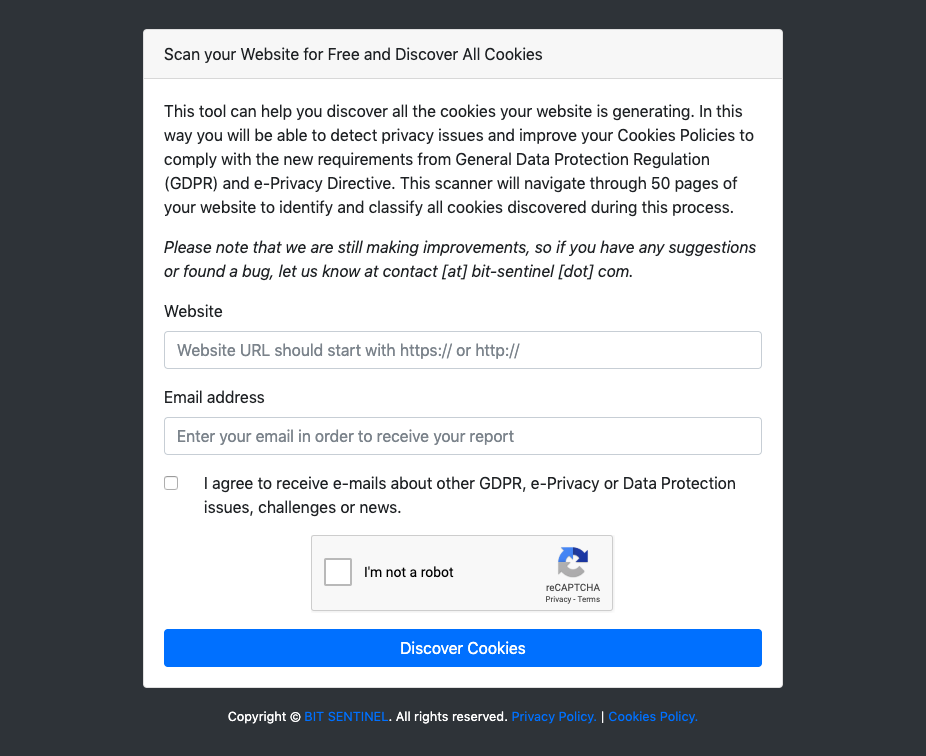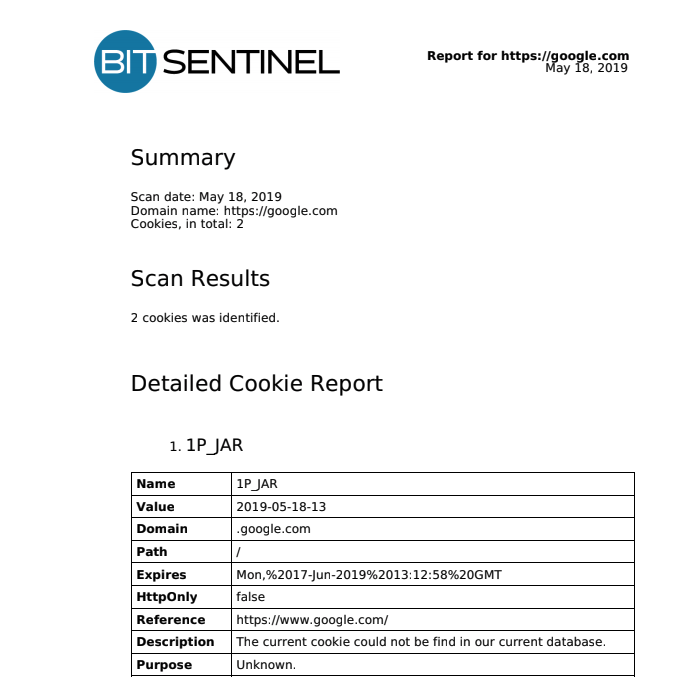Free Cookies Scanner_
Use this free security tool to save time on creating cookie and privacy policies for GDPR and other compliance assets
We created this tool to help you discover all the cookies your website generates.
This free scanner navigates through 50 pages of your website to identify and classify all the cookies it can find in the process.
Over 1,000 companies from all around Europe are already using this free tool to make GDPR compliance easier!
This tool can help you discover all the cookies your website is generating. This way, you will be able to detect privacy issues and improve your Cookies Policy to comply with the new requirements from General Data Protection Regulation (GDPR) and e-Privacy Directive.
You can use it to:
- Get a list of first-party and third-party cookies for your website
- Use this list to build or improve your Cookie Policy
- Add the list of cookies to your Privacy Policy to comply with the General Data Protection Regulation (GDPR) and the e-Privacy Directive
- Get clear and legitimate consent from people who visit your website
Fill in your website URL and email address. When the scan results are ready, you’ll receive an email with your list of cookies.

Free Cookies Scanner FAQ
What are cookies?
These cookies are non-fat, gluten-free, vegan, aaaaand… we’re just kidding, of course! 🙂
The cookies we’re talking about are small files that websites send and which are stored on a user’s computer.
They are designed to hold a tiny amount of data about a particular user and website.
Cookies can be accessed either by the web server or the user’s computer. This allows the server to deliver a website page tailored to a particular user.
Alternatively, the page itself can include a script that can retrieve the cookie data and, as a result, carry information from one visit to the website (or related site) to the next.
Website owners generally use cookies to tailor content and advertising to a user’s habits and informational needs.
This quick guide provides more information about website cookies and their uses.
What is GDPR?
The General Data Protection Regulation (GDPR) (EU) 2016/679 is a regulation that focuses on ensuring data protection and privacy for internet users who are part of the European Union.
GDPR primarily aims to give EU citizens and residents control over their personal data. Additionally, the regulation seeks to simplify the regulatory environment for international business by unifying the regulation across the European Union.
As a core provision, GDPR requires website owners to inform their visitors of the fact that their behavior is tracked or recorded in any way. That’s why you see a cookie notice when you visit a website for the first time (or every time, if you set your browser to never accept cookies).
Moreover, GDPR also addresses the export of personal data outside the EU and EEA.
We encourage you to read more about the regulation and what it takes to achieve GDPR compliance.
What is e-Privacy?
The ePrivacy Regulation (ePR) was proposed by the European Commission to reinforce trust and security in the EU Digital Single Market. The proposal aims to update the legal framework on ePrivacy to fit current data privacy needs.
The ePR’s objectives include:
- Ensuring a consistent level of protection for electronic communications across the EU and a unified manner to ensure it from a legislative perspective
- Adding nuance and specifics to the EU cookie provision with the purpose of streamlining consent and improving user experience while also distinguishing between non-privacy intrusive cookies and the rest of them
- Banning any form of spam, from unsolicited emails to SMS spam and robocalls and more.
You might find it useful to read about the differences between GDPR and ePR.
What a Free Cookies Scanner report looks like
When the scan of your website is complete (less than 5 minutes), you’ll receive an email with the generated list of cookies.
It will look something like this:

We also built these security tools
At Bit Sentinel, we like to use our experience and know-how to make security simpler and more effective for you and everyone who needs this.
That’s why we also created:


